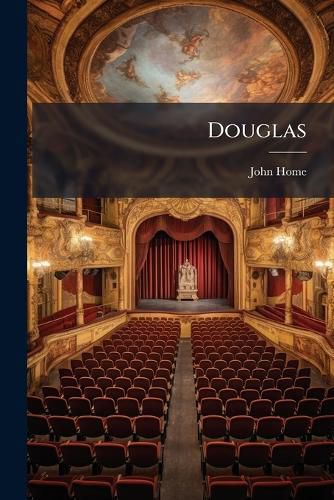Readings Newsletter
Become a Readings Member to make your shopping experience even easier.
Sign in or sign up for free!
You’re not far away from qualifying for FREE standard shipping within Australia
You’ve qualified for FREE standard shipping within Australia
The cart is loading…






Douglas: A Tragedy, by John Home, is a classic work of 18th-century Scottish drama. First performed in Edinburgh in 1756, it tells a tragic tale of love, loss, and mistaken identity within a noble Scottish family. This edition presents the play as it was acted in the theatres of Great Britain and Ireland, offering insight into the theatrical traditions of the time.
Home's dramatic skill and poetic language made "Douglas" an immediate sensation, though also a subject of intense controversy. Though sometimes stilted by modern standards, its powerful themes and dramatic situations continue to resonate, making it a valuable resource for students and enthusiasts of dramatic literature and Scottish history. This edition allows readers to experience the power and pathos that captivated audiences centuries ago.
This work has been selected by scholars as being culturally important, and is part of the knowledge base of civilization as we know it. This work was reproduced from the original artifact, and remains as true to the original work as possible. Therefore, you will see the original copyright references, library stamps (as most of these works have been housed in our most important libraries around the world), and other notations in the work.
This work is in the public domain in the United States of America, and possibly other nations. Within the United States, you may freely copy and distribute this work, as no entity (individual or corporate) has a copyright on the body of the work.
As a reproduction of a historical artifact, this work may contain missing or blurred pages, poor pictures, errant marks, etc. Scholars believe, and we concur, that this work is important enough to be preserved, reproduced, and made generally available to the public. We appreciate your support of the preservation process, and thank you for being an important part of keeping this knowledge alive and relevant.
$9.00 standard shipping within Australia
FREE standard shipping within Australia for orders over $100.00
Express & International shipping calculated at checkout
Stock availability can be subject to change without notice. We recommend calling the shop or contacting our online team to check availability of low stock items. Please see our Shopping Online page for more details.
Douglas: A Tragedy, by John Home, is a classic work of 18th-century Scottish drama. First performed in Edinburgh in 1756, it tells a tragic tale of love, loss, and mistaken identity within a noble Scottish family. This edition presents the play as it was acted in the theatres of Great Britain and Ireland, offering insight into the theatrical traditions of the time.
Home's dramatic skill and poetic language made "Douglas" an immediate sensation, though also a subject of intense controversy. Though sometimes stilted by modern standards, its powerful themes and dramatic situations continue to resonate, making it a valuable resource for students and enthusiasts of dramatic literature and Scottish history. This edition allows readers to experience the power and pathos that captivated audiences centuries ago.
This work has been selected by scholars as being culturally important, and is part of the knowledge base of civilization as we know it. This work was reproduced from the original artifact, and remains as true to the original work as possible. Therefore, you will see the original copyright references, library stamps (as most of these works have been housed in our most important libraries around the world), and other notations in the work.
This work is in the public domain in the United States of America, and possibly other nations. Within the United States, you may freely copy and distribute this work, as no entity (individual or corporate) has a copyright on the body of the work.
As a reproduction of a historical artifact, this work may contain missing or blurred pages, poor pictures, errant marks, etc. Scholars believe, and we concur, that this work is important enough to be preserved, reproduced, and made generally available to the public. We appreciate your support of the preservation process, and thank you for being an important part of keeping this knowledge alive and relevant.